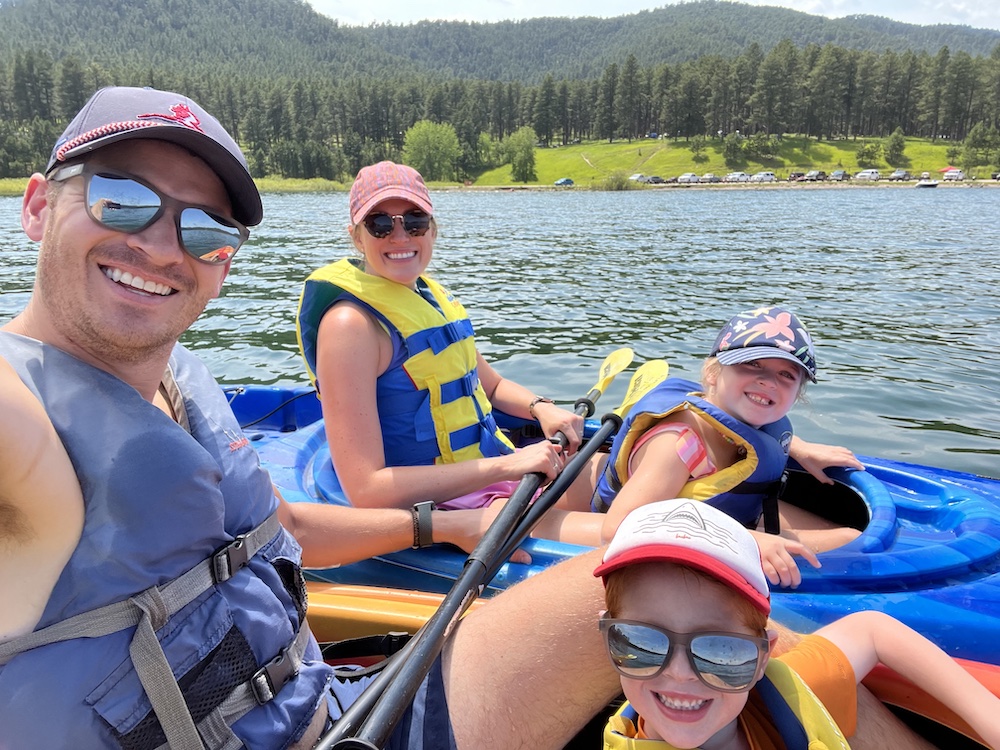The art of sticking to wellness goals
New dentists discuss benefits of nutrition, mindfulness

Blake Ridgway, D.D.S., was a high school and college athlete. At the time, this offered a reliable structure to get his body moving and was the main way he prioritized wellness. But as he grew older, Dr. Ridgway discovered that exercise alone would no longer suffice in maintaining optimal health.
So recently, he’s made the decision to focus on incorporating proper nutrition into his daily life.
“My metabolism is not what it used to be, so I’m learning that I can’t just exercise my way through anything and that diet actually matters now that I’m in my middle 30s,” Dr. Ridgway said.
The impetus for this choice stemmed from seeing aging happen around him. Watching friends, family members and relatives battle health struggles has made Dr. Ridgway more aware of his own health and mortality.
As an avid outdoor enthusiast, partner dentist of a small group practice in Sioux Falls, South Dakota, and father of two young children, Dr. Ridgway greatly desires to see what the future has in store.
“You want to be around when you’re older. Setting that foundation when you’re younger is what I think helps with that,” he said.
To achieve this goal, Dr. Ridgway said he starts every day with a glass of green juice packed with vitamins, minerals and probiotics. The result, he said, is “passive mindfulness.”
“It really sets the mindset for the day off, ‘Today, I’m going to have this drink, and I’m going to be healthy.’ And since it’s every single day, when I make a poor choice for lunch or dinner, I'm thinking back to, ‘I started my day this way, and it’s the way I’m going to finish it,’” he said.

Mina Ghorbanifarajzadeh, D.M.D., is also a proponent of beginning her day with intentionality. Each morning, she aims to drink a cup of coffee with a sense of peace.
“I breathe and meditate as I enjoy my coffee and [am] really mindful about it. I know I failed that day when my cup of coffee is half [finished] and cold,” she laughed. “It’s being intentional about one thing you do every day that’s for yourself.”
The goal is to become as present and connected to oneself as possible while engaging in at least one daily activity, whether it’s sipping coffee, applying makeup or driving to work.
Dr. Ghorbanifarajzadeh recognizes that this is oftentimes easier said than done. A senior clinical manager at Overjet, a dental artificial intelligence company, she knows what a busy schedule looks like. This means that her daily practice of drinking coffee intentionally is just that: a practice.
Sometimes life gets in the way, and rituals don’t always get completed. When this happens, she said, it’s important to first have grace and accept that it happens since “the only thing consistent in life is inconsistency.”
“And then, B, what other things bring you back? Sure, the time to have coffee has passed. That morning ritual has passed that you wanted to be intentional with. Where is the next opportunity for that? You have to be mindful and start learning these things about yourself,” she said.
Balancing the external world with one’s internal world isn’t always easy, Dr. Ghorbanifarajzadeh noted, but it is rewarding. That’s why she made a concerted effort this year to prioritize time for herself.
“Externally we achieve a lot, and when we overachieve externally, we start forgetting about what we need internally,” she said. “Have I made sure I got to go to the gym? Have I made sure I made time to stare out the window and not at a screen, and not be so overstimulated? Because that’s where creativity happens. That’s where you get to heal and balance. That’s where peace comes in.”
Both Drs. Ridgway and Ghorbanifarajzadeh offered advice to other new dentists looking to prioritize wellness. Many providers lead full and hectic lives, with physical and emotional burnout becoming more and more prevalent.
More than 80% of dentists reported feeling some type of stress about their career, according to survey data from the 2024 ADA Council on Communications Trend Report. This makes carving out time to check in and connect to oneself even more crucial, Dr. Ghorbanifarajzadeh emphasized.
“As crazy as it sounds, you have to schedule for it. If we can schedule in our patients, if we can schedule in our meetings, if we can schedule in brunch, we also need to schedule in a minimum of three to four minutes just for us,” Dr. Ghorbanifarajzadeh said.
Checking in is also necessary as it helps to determine what one’s personal needs are, Dr. Ridgway said. Because dentists’ lives are ever-evolving, their needs are ever-evolving, too. It’s important to allow for that flexibility, he said.
“Focus on what you need. Every year may be different. For the last five years, it wasn’t as much about nutrition; it was just general fitness [for me],” Dr. Ridgway said. “Your needs change every year, so a different goal each year is certainly acceptable, OK and brings variety to your mindset.”
For ADA resources related to wellness, visit ADA.org/wellness.



